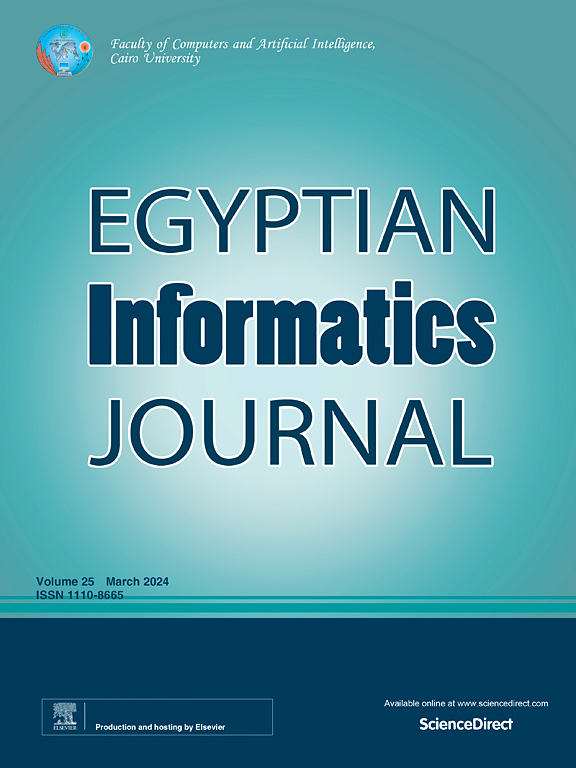整合多组学数据用于早期癌症检测的高级分割方法
IF 5
3区 计算机科学
Q1 COMPUTER SCIENCE, ARTIFICIAL INTELLIGENCE
引用次数: 0
摘要
全球癌症负担凸显了早期诊断的迫切需要。传统的诊断方法,依赖于单一的生物标志物或成像,往往缺乏全面的预测准确性。现有系统往往侧重于基因组或转录组等一种或两种类型的组学数据,而没有全面整合多个组学层(基因组、转录组、蛋白质组和表观基因组)。这一限制限制了捕捉癌症的全部生物学复杂性和异质性的能力,这对于准确预测和理解疾病机制至关重要。我们提出了一种先进的癌症预测方法,称为集成多组学分割(IMOS),它通过整合基因组、转录组、蛋白质组和表观基因组信息来增强多组学数据的处理。IMOS将数据分成有生物学意义的区域,便于更精确的分析。IMOS的平均精密度为92%,灵敏度为88%,特异度为94%,比传统方法的精密度提高15%,灵敏度提高10%,特异度提高8%。使用基因组数据共享(GDC)数据集进行验证,包括不同的癌症类型,证明了IMOS的稳健性,准确性为91%,灵敏度为87%,特异性为93%。该系统在聚类评价方面也很出色,剪影得分在0.55到0.62之间,戴维斯-博尔丁指数在三个聚类时达到最低。本文章由计算机程序翻译,如有差异,请以英文原文为准。
Advanced segmentation method for integrating multi-omics data for early cancer detection
The global burden of cancer underscores the critical need for early diagnosis. Traditional diagnostic methods, relying on single biomarkers or imaging, often lack comprehensive predictive accuracy. Existing systems often focus on one or two types of omics data, such as genome or transcriptome, but do not comprehensively integrate multiple omics layers (genomic, transcriptomic, proteomic, and epigenomic). This limitation restricts the ability to capture the full biological complexity and heterogeneity of cancer, which can be critical for accurate prediction and understanding of disease mechanisms. We propose an advanced cancer prediction method called Integrated Multi-Omics Segmentation (IMOS), which enhances the processing of multi-omics data by integrating genomic, transcriptomic, proteomic, and epigenomic information. IMOS segments data into biologically meaningful regions, facilitating more precise analysis. IMOS achieves outstanding performance with an average precision of 92 %, sensitivity of 88 %, and specificity of 94 %, outperforming traditional methods by 15 % in precision, 10 % in sensitivity, and 8 % in specificity. Validation using the Genomic Data Commons (GDC) dataset, encompassing diverse cancer types, demonstrated IMOS’s robustness with accuracy of 91 %, sensitivity of 87 %, and specificity of 93 %. The system also excels in clustering evaluation, with a silhouette score ranging from 0.55 to 0.62 and the lowest Davies-Bouldin index achieved with three clusters.
求助全文
通过发布文献求助,成功后即可免费获取论文全文。
去求助
来源期刊

Egyptian Informatics Journal
Decision Sciences-Management Science and Operations Research
CiteScore
11.10
自引率
1.90%
发文量
59
审稿时长
110 days
期刊介绍:
The Egyptian Informatics Journal is published by the Faculty of Computers and Artificial Intelligence, Cairo University. This Journal provides a forum for the state-of-the-art research and development in the fields of computing, including computer sciences, information technologies, information systems, operations research and decision support. Innovative and not-previously-published work in subjects covered by the Journal is encouraged to be submitted, whether from academic, research or commercial sources.
 求助内容:
求助内容: 应助结果提醒方式:
应助结果提醒方式:


